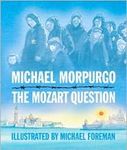Through the Looking Glass Children's Book Reviews
The Mozart Question
Illustrator: Michael Foreman
Historical Fiction
For ages 9 to 12
Candlewick, 2008 ISBN: 978-0763635527
Lesley can hardly believe her good luck. Her boss has given her a once-in-a-lifetime assignment – to interview Paolo Levi, the great violinist. Levi does not readily grant interviews and being a very private person, he is not fond of speaking to the press. Lesley is therefore very nervous when she knocks on the door of his home in Venice, Italy.
Levi is not unfriendly but he is not all that welcoming either. Because she is so nervous Lesley makes a huge mistake. She mentions that she knows that she isn't supposed to ask "the Mozart question" because she was told not to. Lesley is horrified that these words even came out of her mouth and she fully expects Levi to end the interview there and then. Instead, to Lesley's amazement, the violinist proceeds to tell her his story. He tells her things that no else knows, and he finally explains the whole matter of the Mozart question.
Lesley finds out that Levi's father was once a violinist, but when Levi was a child his father would not have anything to do with music or the violin. Levi's parents refused to tell their curious son why this was so, or why no one ever played the violin which was kept on top of a cupboard in Levi's home. After a while however, Levi's mother finally agreed to let Levi see the violin if he would stop asking his incessant questions about the instrument and his father's past.
What Levi's parents did not plan on was their son's growing love of music. Levi even began to take violin lessons in secret. It was only when the secret came out that Levi learned that his parents and his violin teacher met in a Nazi concentration camp where they were all forced to play their violins for their captors.
In this stunningly written and very moving book Michael Morpurgo pays tribute to the Jewish musicians who played musical instruments during their captivity in German concentration camps. Their skill kept them alive, and they played to survived. Morpurgo also explores the idea that secrets are often no better than lies. There comes a time when the truth must be told and only then can healing begin.
With a lyrical text and beautiful watercolor illustrations throughout, this book is a real gem which music lovers of all ages will appreciate.




